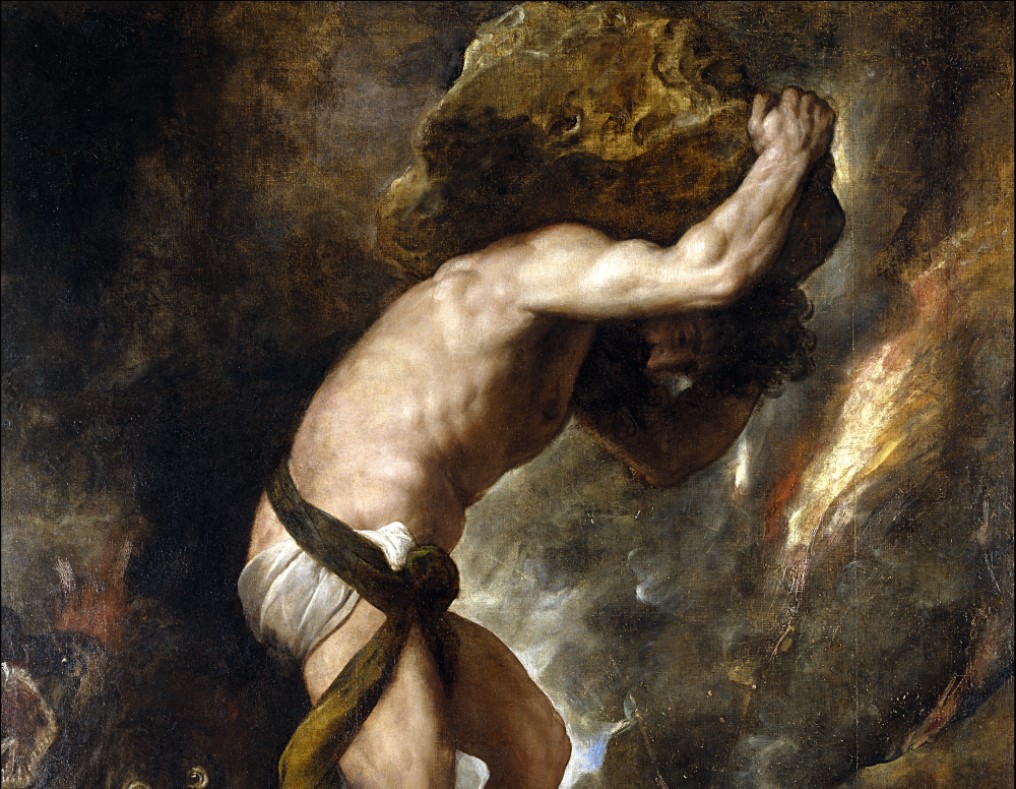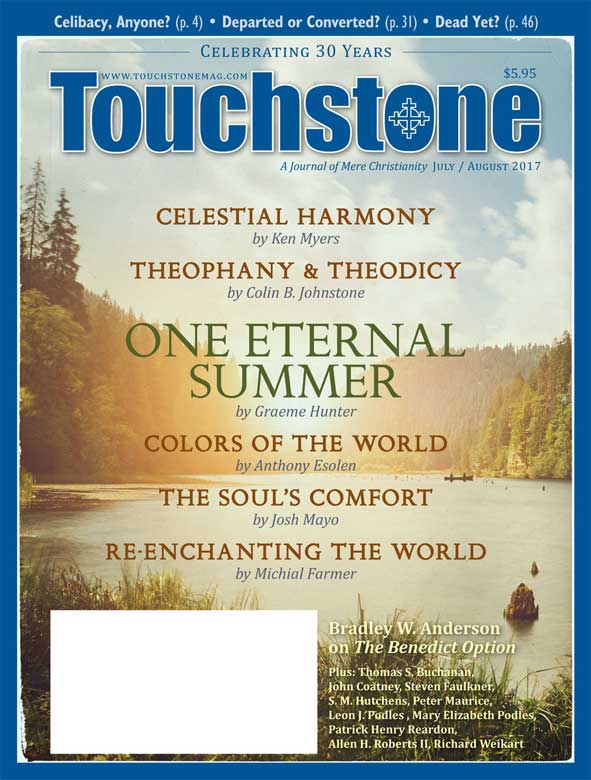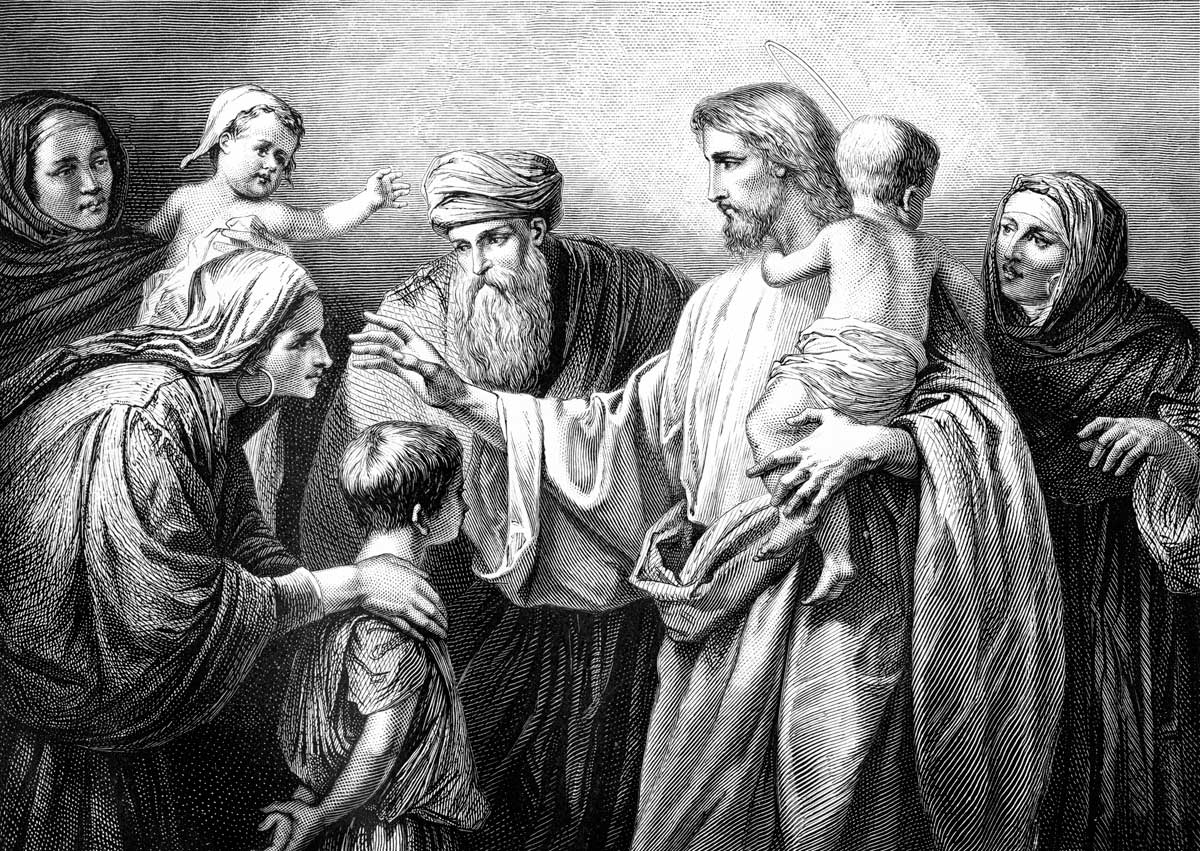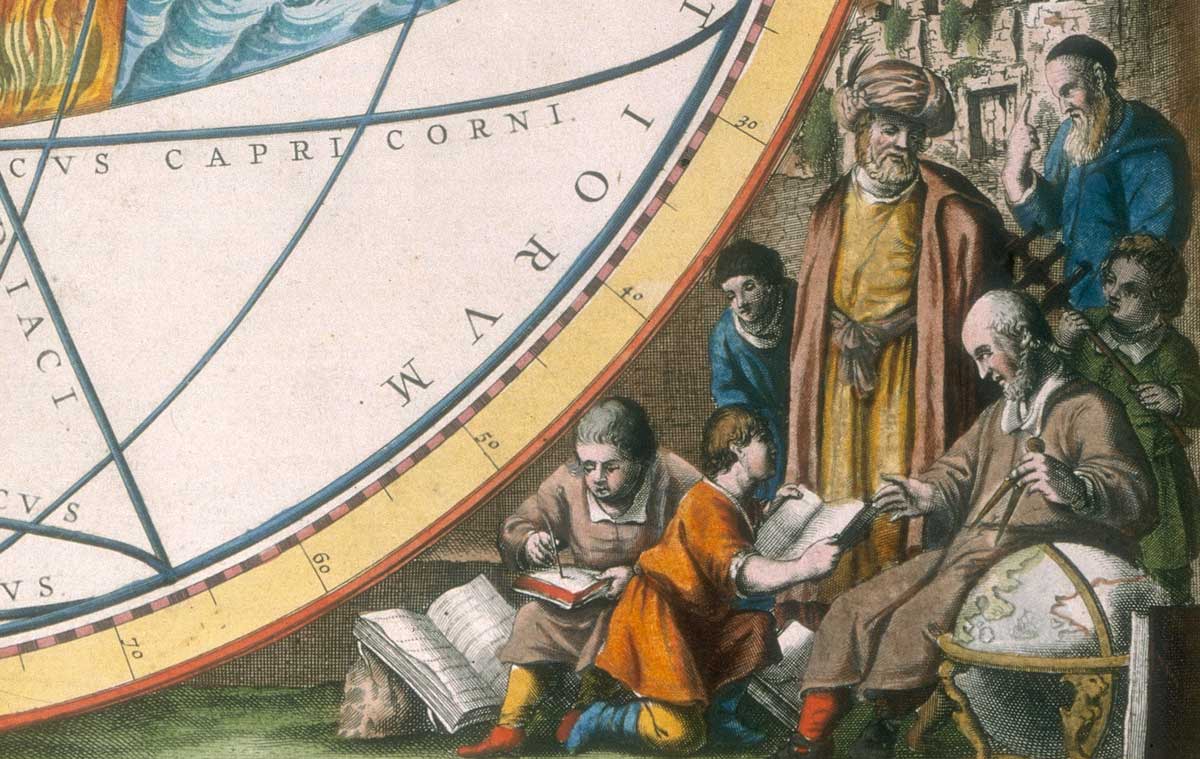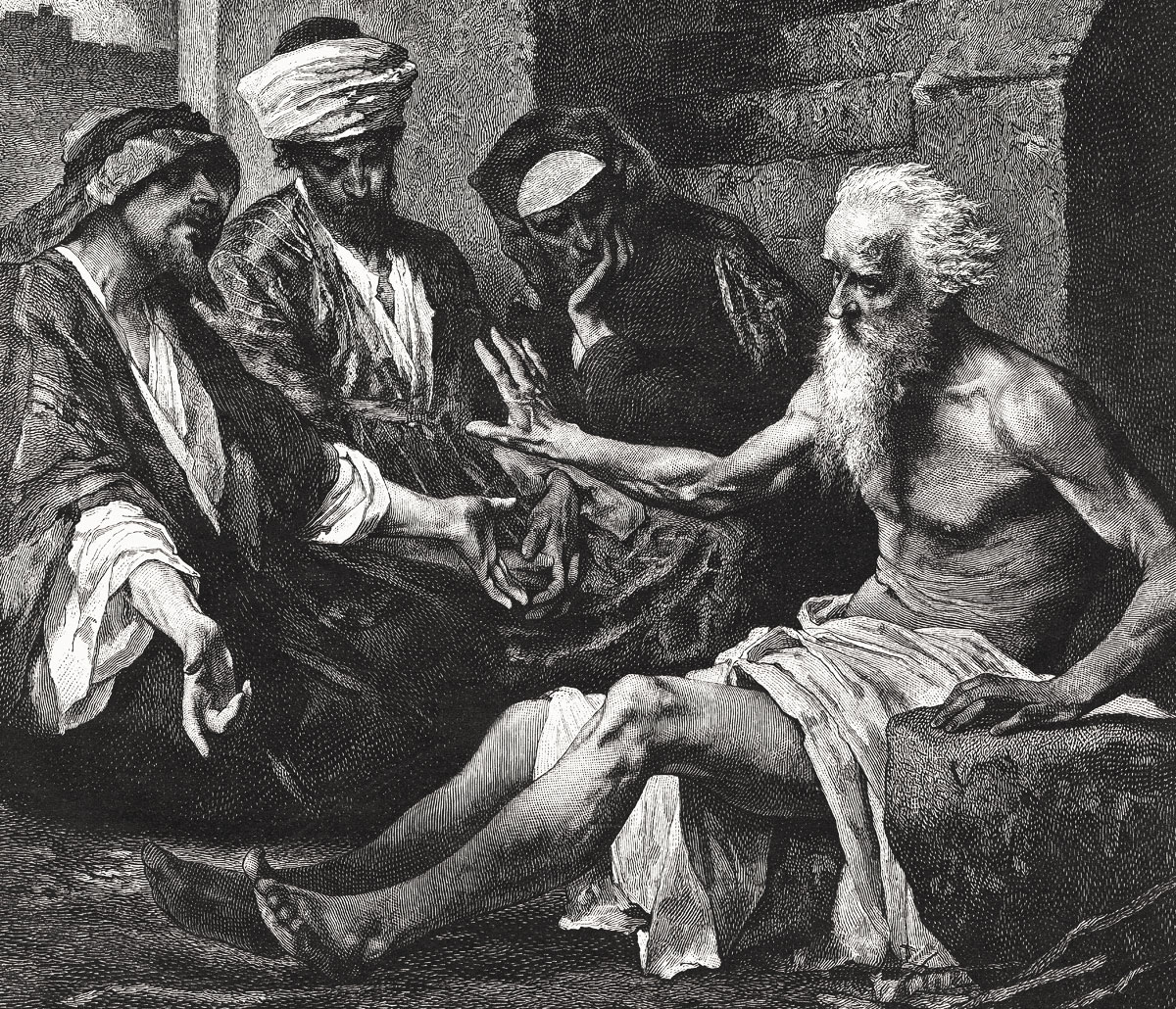Feature
Altering All Things
Despair, Imagination & the Re-enchantment of the World
by Michial Farmer
In his 1845 "Sonnet—To Science," Edgar Allan Poe sounds a note that has become quite familiar. Science, the "true daughter of Old Time," has an ammoniac gaze that "alterest all things"—or, to put it more accurately, destroys them in their deepest essence. Poe finds science fundamentally unlovable in its insistence on demythologization:
Hast thou not dragged Diana from her car?
And driven the Hamadryad from the wood
To seek a shelter in some happier star?
Hast thou not torn the Naiad from her flood,
The Elfin from the green grass, and from me
The summer dream beneath the tamarind tree?
When we look at the world through the scientific lens that Poe criticizes in this poem, we see something radically different from what pre-scientific peoples, pagan and Christian alike, saw. Since Newton mechanized the universe in his Principia (1687), we have increasingly seen the world as a series of causes and effects—and furthermore, causes and effects that scientists will eventually be able to explain in their entirety. The first rule of the Principia is that "we are to admit no more causes of natural things than such as are both true and sufficient to explain their appearances"; the second is that "to the same natural effects we must, as far as possible, assign the same causes."
Newton's own intensely held religious faith notwithstanding, these rules eventually created a scientific milieu in which the world was seen as entirely a natural phenomenon and thus created entirely by natural causes. To varying degrees, the philosophy of the eighteenth-century Enlightenment (along with its nineteenth- and twentieth-century heirs) attempted to reproduce mechanistic Newtonian physics in all other realms of earthly activity. Rationalism (the notion that truth can be discovered only through the pure workings of reason) and empiricism (the notion that truth can be discovered only through the evidence of the senses) seem like opposites, but in truth, there is little difference, in this project, between them. They both seek a kind of certainty that would not have been conceivable before the modern age.
Scientific accuracy became the goal in psychology (Hume's Enquiry Concerning Human Understanding suggests that "accurate and just reasoning is the only catholic remedy, fitted for all persons and all dispositions; and is alone able to subvert that abstruse philosophy and metaphysical jargon, which, being mixed up with popular superstition, renders it in a manner impenetrable to careless reasoners, and gives it the air of science and wisdom"); in religion (hence the birth of the "divine clockmaker" deist God); and in ethics (Kant's Groundwork for the Metaphysics of Morals attempts to found an entirely unbreakable and objective ethical system).
The typical dichotomy was between "reason" and "superstition" (terms that need to be put in scare quotes, of course, since what's reasonable and what's superstitious depends largely on a person's starting assumptions—witness Newton's belief in alchemy). Any ancient belief that could be not be squared with the new mechanistic universe had to be discarded; thus Diana was dragged from her car, and religion, as Kant put it, had to be formulated "within the bounds of bare reason."
It would be madness to reject the Enlightenment altogether, of course. The same ideas and assumptions that "tore the Naiad from her flood" also created a number of things that sensible modern people would prefer not to do without: modern medicine, electronics, air-conditioning. But these comforts have a price, perhaps even a necessary price. We Westerners have surrendered our sense of human life's being grounded in something deeper than nature, and in so doing we have essentially surrendered our belief that life has some sort of intrinsic value.
An essay like Albert Camus' The Myth of Sisyphus is equally a product of the Enlightenment and a protest against it. On the one hand, Camus looks at the world as it has been handed to him by two hundred years of European philosophy and finds it utterly bereft of meaning, utterly inhuman. It is a collection of facts, in which "an infinite number of shimmering fragments is offered to the understanding. We must despair of ever reconstructing the familiar, calm surface which would give us peace of heart." On the other hand, Camus cannot accept this mechanized, meaningless world with the same blithe spirit that typified the framers of the Enlightenment.
That the essay is framed around the assumption that suicide is an (perhaps even the) appropriate response to the human encounter with the inhuman world suggests that Camus recognizes what le bon David could not: a world of mechanism is not a world we can comfortably inhabit. We have the sense, however deluded, that we were meant for something beyond fornication and reading the papers.
Surrounded by Icebergs
What we are talking about is an international process of disenchantment, whereby our materialist, mechanistic conception of the world destroys everything that once sustained the human race. The concept was popularized by the German sociologist Max Weber, who perfectly describes the modern condition in "Science as a Vocation": "Natural science gives us an answer to the question of what we do if we wish to master life technically. It leaves quite aside, or assumes for its purposes, whether we should and do wish to master life technically and whether it ultimately makes sense to do so."
The confusion of these two viewpoints has led us to a world in which the first question—the question of the technical mastery of the world—has been allowed to displace the second, and the results have been profound, even disastrous:
The fate of our times is characterized by rationalization and intellectualization and, above all, by the "disenchantment of the world." Precisely the ultimate and most sublime values have retreated from public life either into the transcendental realm of mystic life or into the brotherliness of direct and personal relations.
In the 98 years since Weber delivered this lecture, they have retreated still further, as the West grows increasingly less mystical and "direct and personal relations" become harder and harder to maintain in the face of technopoly and political fragmentation. We grow more disenchanted daily. Not even the movies, once a quasi--religious delivery mechanism for our dreams and hopes, are safe—witness Neil deGrasse Tyson's periodic debunkings of popular science-fiction films, as if moviegoers went to see The Martian or The Force Awakens primarily for realistic depictions of astrophysics.
Weber does not use the world nihilism to describe a disenchanted world, but the word is, I think, appropriate. How else can we describe a world that has fostered the rise of ISIS, a world in which mass shootings occur literally almost daily, a world in which abortion is seen not even as a necessary evil but as a positive good—and perhaps most disturbingly, a world in which Americans lack even the shared moral and political vocabulary to discuss these topics, let alone come to common solutions for them? Most of us, I suspect, instinctually feel that society itself is lost, that it has come unmoored and is heading for some sort of horrible shipwreck, even if we disagree about the nature of the iceberg.
My sense, in fact, is that we are surrounded by icebergs, all of them closing in. We live in a world with no shared values, which is to say a world with no genuine values at all, which is to say a meaningless world. We are, many of us, aware of it, and yet if my own experience is typical, we're utterly in the dark about any possible solution. We are, in other words, in despair; and at our darkest moments—again, if my own experience is typical—we are tempted to shut ourselves off and allow the world to continue its slide into the abyss.
I don't want to blame anything as nebulous as "science" for the condition in which we find ourselves, nor do I want to suggest that scientists as a group are peddlers of meaninglessness and despair. But there's a clear connection between the Enlightenment and post-Enlightenment view of the world as a collection of mechanistic and value-neutral "facts" and the despair and nihilism that characterize the West today. Cut off from our prior sources of meaning, we have become exhausted. When the Hamadryad is driven from the woods, the woods dry up and disappear.
Western Faith Floundering
Christianity has floundered in the face of this cultural nihilism. The periodic bad news from the Pew Research Center confirms what most Christians are already afraid of: despite its growth in other parts of the world, the faith is on the ropes in the West, and major denominations, powerhouses during the Christian century, may entirely disappear in the next century. Professors at Christian colleges, meanwhile, complain that even those students who have remained Christians until the end of their teens come into college with a shocking lack of biblical and theological knowledge; here, too, the common vocabulary that once fostered a common meaning to human experience has decayed.
Christianity was once an agent of hope—and it clearly still is in the Global South—but in Europe and America, it is crumpling in the face of the meaninglessness that surrounds it. Many Christians, myself included, are far from being ready to "give a reason for the hope within us"; we can barely find that hope. We, too, are exhausted.
I suspect, in fact, that many of us have imbibed the mechanistic view of the universe more than we'd like to admit we have. We look into the natural world and fail to find the divine presence in it. Where previous centuries saw the hand of God in the movements of the stars and the lives of earthly creatures, we see—whether we admit it in front of other Christians or not—the blind forces of nature. The popularity of worship songs that ask for God's power and presence suggest that we cannot ordinarily see God's power and presence in the world around us; they are tacit admissions that the material world is as empty and factual as we've been told it is.
John Updike's early short story "Dentistry and Doubt" puts our struggle into words. Its protagonist, an American clergyman living in England, is thrust into a crisis of faith in the dentist's chair. The cosmos looms before him, empty and terrible, and he wonders where God's presence could be in the forces of nature:
There were things Burton could comprehend. And then there were things he could not—His aeon-long wait as life struggled up from the atom. With what emotion did He watch all those preposterous, earnest beasts labor up out of the swamp and aimlessly perish on the long and crooked road to Man? And the stars, so far off, the comedy of waste spaces—theologians had always said infinite, but could they have meant that infinite? Once, Burton had asked his father if he believed in purgatory. "Of course I do," he had snapped, jabbing toward the floor with his pipestem. "This is purgatory."
I suspect the sentiment feels even truer today than it did in 1958. Our world frequently seems exhausted, spent, disenchanted—in a word, hopeless.
It should be obvious that the Church cannot live as the Church under such conditions. At the very least, the Church can't live as the Church when the nihilism and despair of the majority culture have seeped under the sanctuary door. The Church's task was once to redirect and purify the enchantment of the world around it. Ancient Greeks and Romans—at least on the street level—had no trouble believing that supernatural forces directed the universe; the problem was that they mischaracterized those forces. Thus, Paul could address them on Mars Hill by appealing to their preexisting belief in "an unknown god" and then correcting it: "What therefore you worship in ignorance, this I proclaim to you. The God who made the world and all things in it, since he is Lord of heaven and earth, does not dwell in temples made with hands" (Acts 17:23–24).
When Christianity became the more-or-less official religion of most of the Western world, the Church's job was to correct heresy and thus redirect its parishioners toward the appropriate worship of God. This process occasionally went awry (as the Inquisition, the Crusades, and the Salem witch trials demonstrate), but it produced the magnificent buttress of the creeds that maintain the faith even today.
But the Christian consensus has rotted, and the West has become disenchanted. The Church's task in the -twenty-first century looks very different. We must, in -effect, re-enchant a world that has been systematically and mechanically stripped of its divine presence; we must re-instill meaning into a world that aggressively disbelieves in meaning. But how can we do that when we ourselves are often skeptical that meaning can adhere to the bare and ugly facts of the world around us?
The Will & Inclination to Believe
What I am proposing, or beginning to propose, here is a program of incredible imagination. Faith, in the midst of the nihilism of our culture, must be an act of the imagination, because it entails our looking at a world that appears meaningless and insisting that it nevertheless has meaning. At the end of the nineteenth century, a resurgence of Enlightenment thought seemed poised to crush faith once and for all. "The Sea of Faith," sighed Matthew Arnold in 1867,
Was once, too, at the full, and round earth's shore
Lay like the folds of a bright girdle furled.
But now I only hear
Its melancholy, long, withdrawing roar,
Retreating, to the breath
Of the night-wind, down the vast edges drear
And naked shingles of the world.
But Arnold's solution—"Ah, love, let us be true / To one another!"—was not enough, because it accepted the disenchantment of the world and suggested that modern people must simply make do with an empty cosmos.
More helpful, I think, is William James's 1896 lecture "The Will to Believe," in which he suggests that religious faith (at least in his era, and presumably in ours, too) is not a matter of being convinced by rational evidence or empirical data, but of choosing it. I am suggesting something similar here. I am suggesting that we look at a world that does not strike us as concealing the presence of God, a world that we have been told again and again is a mere collection of causes and effects, and we declare that it is not so, that God "fills all in all" (Eph. 1:23), that "the heavens are telling of the glory of God; / And their expanse is declaring the work of his hands" (Ps. 19:1). On one level, this declaration is the ultimate Christian imaginative act, because we are imagining something to be true that our observation cannot prove or justify; on another level, it is the ultimate act of Christian faith, because we are choosing to believe the things the Bible and the creeds have told us all along.
Paired with this very adult will to believe is a childish inclination to believe. I use the word childish purposely, because our nihilistic culture naturally asserts that the things Christians have traditionally believed are childish fairy tales. For this reason, they are sometimes hard even for Christians to believe. I am sometimes struck with crises of disbelief when I am in church, suddenly thinking, "No one can possibly actually believe these things." Such crises are the intrusions of culture into faith, and twenty-first-century Christians must expect them without allowing them to undermine our faith. I propose, then, that we accept the label of childishness, with the caveat that the alternative to childishness is the sort of empty materialism that makes life an absurdity.
The truth is that the gospel, as Frederick Buechner notes in Telling the Truth, really is a kind of fairy tale—it just happens to be the true myth that gives life to all the other fairy tales. We do ourselves no favors when we act like it can be made palatable to the materialist mind. It would be better to admit that what looks like pure fantasy to the Richard Dawkinses and A. C. Graylings of the world is the deep truth that sustains our existence. Believing the fairy tale restores magic to the world. When we are children, after all, we believe instinctually that every frog is hiding a prince and that every inanimate object is waiting to come to life. Maybe these absurdities are worth believing; as Christ says of the loud crowds that follow him, shouting praise, "if these become silent, the stones will cry out!" (Luke 19:40).
The Role of Artists
Because faith is essentially an act of the imagination, Christian artists have a tremendous role to play in re-enchanting the world. Art has the power, after all, to re-orient the world for us, and after it does so, we will never see the world the same way again. To give a mundane example: I was once walking through the powerful Minnesota wind—never a particularly pleasant prospect—when the term "blustery day" came to my mind. I heard the term as a child, from Winnie the Pooh, and its effect on my adult emotions was immediate. Suddenly the gray, frozen Minnesota day seemed full of grace; it seemed a reflection of the mystical Anglophilia typical of so many classic children's tales.
I had been transported, or to put it another way, the world around me had been swapped for a better one. This new world was inhabitable and life-giving in a way that the world it replaced had not been. But, importantly, it was also the same world. I was not deluded; I was not under the illusion that I'd actually been transported to the Hundred Acre Woods. The real world had merged with the world of the imagination and was improved by the blurring of boundaries. I have not gone into the wind without some of that magic remaining ever since.
It is the responsibility of the Christian artist, then, to present us with improved visions of our own world, visions that re-instill the grace of God into our gray and meaningless circumstances. John Updike was a master at this. His theological vision sometimes (and quite understandably) gets lost in his long-standing obsession with sexuality, but almost all of his fiction features descriptions of the world that linger on its physical details in such a way as to make them more than merely physical. A passage from Rabbit, Run will be instructive. Rabbit Angstrom and the Episcopalian minister Jack Eccles are playing golf and arguing about Rabbit's responsibilities toward his family:
His heart is hushed, held in mid-beat, by anger. He doesn't care about anything except getting out of this tangle. He wants it to rain. In avoiding looking at Eccles he looks at the ball, which sits high on the tee and already seems free of the ground. Very simply he brings the clubhead around his shoulder into it. The sound has a hollowness, a singleness he hasn't heard before. His arms force his head up and his ball is hung way out, lunarly pale against the beautiful black blue of storm clouds, his grandfather's color stretched dense across the north. It recedes along a line straight as a ruler-edge. Stricken; sphere, star, speck. It hesitates, and Rabbit thinks it will die, but he's fooled, for the ball makes its hesitation the ground of a final leap: with a kind of visible sob takes a last bite of space before vanishing in falling.
The scene Updike describes here is utterly and undeniably mundane—any golfer has, I'm sure, experienced something similar to it dozens if not hundreds of time. And yet the amount of attention Updike pays to it, and the imagination he projects onto its materiality, allows it to transcend that materiality. He uses idealist language—the singleness of the sound of the ball, the "line straight as a ruler-edge"—and cosmic language to convey this everyday occurrence, and in so doing, he brings something genuinely religious to bear on the decidedly secular game of golf.
The ball, after all, enacts a kind of resurrection, a fact that is lost on neither the careful reader nor Rabbit, who immediately yells, "That's it!"—a reference to his earlier insistence that behind the drab Pennsylvania suburbs "there's something that wants me to find it." There's no preaching in this scene, no explicit connection between the golf game and the Christian life that we might expect from an allegorical writer—and yet the connection is all the stronger for its implicitness. Updike's refusal to preach allows his re-enchanted world to become our own; subtly, we are told that the drab world we live in also has something behind it that's looking for us.
Ancient Truth Painted on a Postmodern Canvas
Of course, not every Christian artist is going to do exactly what Updike does here, and there are as many routes to re-enchantment as there are artists to travel them. Nor do I want to imply that only Christian artists are capable of re-enchanting the world. Any piece of art worth its salt enacts such a re-enchantment. But Christians re-enchant the world in a particularly Christian way, whether we're talking about Marilynne Robinson's quiet visions of lived spirituality or Christian Wiman's self-questioning supernaturalism. (I have to point to his poem "From a Window Here," in which he tells us that he has seen "a tree inside a tree / rise kaleidoscopically / as if the leaves had livelier ghosts," only to point out that "Of course I knew those leaves were birds.")
As the Christian consensus in the West fades even further, Christian artists are more important than ever. Their job is not to tell us what to believe, however, but to enact that belief on the world, to take the gray world of materialist mechanism and hand us a world infused with God's Technicolor presence. In this sense, all religious faith is a form of artistry, a painting of ancient truths onto a blank, and bleak, postmodern canvas.
Michial Farmer is the author of Imagination and Idealism in John Updike’s Fiction (Camden House, 2017) and the translator of Gabriel Marcel’s Thirst (Cluny, 2021). He is a contributing editor at Front Porch Republic, and his essays have appeared in Local Culture, America, and Dappled Things, among other places. He teaches high-school history in Atlanta, where he is a member of St. Jude the Apostle Catholic Church.
subscription options
Order
Print/Online Subscription

Get six issues (one year) of Touchstone PLUS full online access including pdf downloads for only $39.95. That's only $3.34 per month!
Order
Online Only
Subscription

Get a one-year full-access subscription to the Touchstone online archives for only $19.95. That's only $1.66 per month!
bulk subscriptions
Order Touchstone subscriptions in bulk and save $10 per sub! Each subscription includes 6 issues of Touchstone plus full online access to touchstonemag.com—including archives, videos, and pdf downloads of recent issues for only $29.95 each! Great for churches or study groups.
Transactions will be processed on a secure server.
more on christianity from the online archives
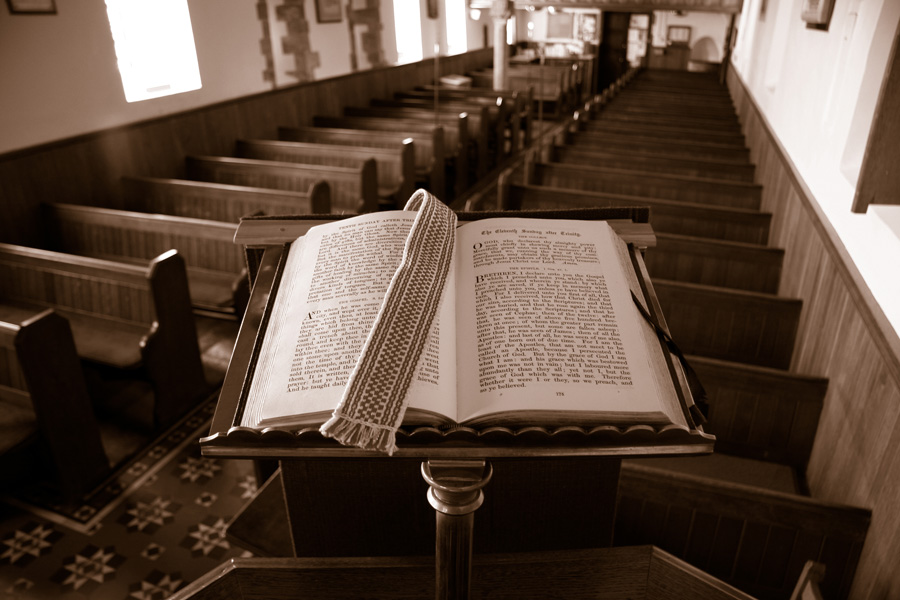
8.4—Fall 1995
The Demise of Biblical Preaching
Distortions of the Gospel and its Recovery by Donald G. Bloesch
more from the online archives
calling all readers
Please Donate
"There are magazines worth reading but few worth saving . . . Touchstone is just such a magazine."
—Alice von Hildebrand
"Here we do not concede one square millimeter of territory to falsehood, folly, contemporary sentimentality, or fashion. We speak the truth, and let God be our judge. . . . Touchstone is the one committedly Christian conservative journal."
—Anthony Esolen, Touchstone senior editor






